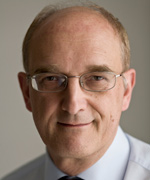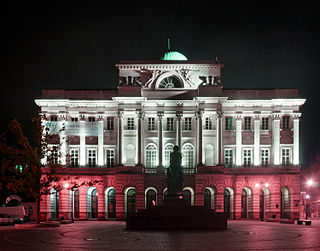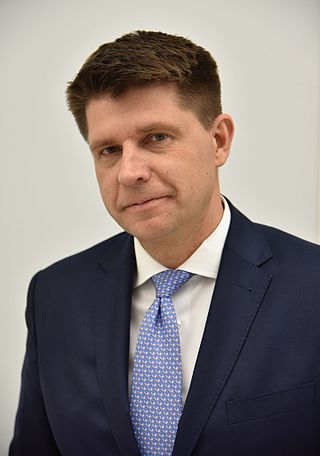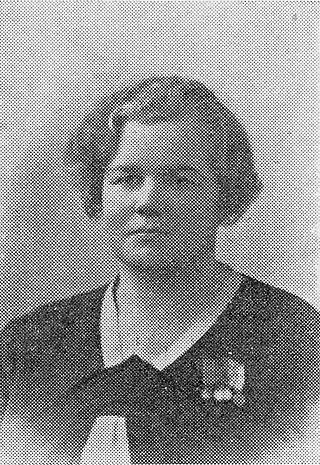
Leszek Cezary Miller is a Polish politician. He has served as a Member of the European Parliament (MEP) since July 2019.

Leszek Henryk Balcerowicz is a Polish economist, statesman, and Professor at Warsaw School of Economics. He served as Chairman of the National Bank of Poland (2001–2007) and twice as Deputy Prime Minister of Poland.

The Polish Academy of Sciences is a Polish state-sponsored institution of higher learning. Headquartered in Warsaw, it is responsible for spearheading the development of science across the country by a society of distinguished scholars and a network of research institutes. It was established in 1951, during the early period of the Polish People's Republic following World War II.

Leszek Kołakowski was a Polish philosopher and historian of ideas. He is best known for his critical analyses of Marxist thought, such as in his three-volume history of Marxist philosophy Main Currents of Marxism (1976). In his later work, Kołakowski increasingly focused on religious questions. In his 1986 Jefferson Lecture, he asserted that "we learn history not in order to know how to behave or how to succeed, but to know who we are".

SGH Warsaw School of Economics is the oldest and most prestigious business school in Poland.

Danuta Maria Hübner(née Młynarska, Polish:[daˈnutaˈxʲybnɛr] or ; born 8 April 1948) is a Polish politician and Diplomat and Economist and Member of the European Parliament. She has served as European Commissioner for Regional Policy from 22 November 2004 until 4 July 2009, when she resigned to become a Member of European Parliament for the Civic Platform. In 2012, Professor Hübner became a member of the International Honorary Council of the European Academy of Diplomacy.

The Medical University of Warsaw is one of the oldest and the largest medical schools in Poland. The first academic department of medicine was established as far back as two centuries ago in 1809. It is considered to be one of the most prestigious and reputable schools nationally for the medical sciences, partly due to its affiliation with a number of large hospitals in Poland.

The University of Warsaw is a public research university in Warsaw, Poland. Established in 1816, it is the largest institution of higher learning in the country, offering 37 different fields of study as well as 100 specializations in humanities, technical, and the natural sciences.

Czesław Bobrowski was a Polish economist. In postwar Poland, he was a director of Central Planning Office from 1945–1948, author of the Three-Year Plan. He was also a member of the State National Council (1945–1947) and Parliament (1947–1948).

Sir Leszek Krzysztof Borysiewicz is a British professor, immunologist and scientific administrator. He served as the 345th Vice-Chancellor of the University of Cambridge, his term of office started on 1 October 2010 and ended on 1 October 2017. Borysiewicz also served as chief executive of the Medical Research Council of the UK from 2007-2010 and has held the role of chairman at Cancer Research UK since 2016.
The Nencki Institute of Experimental Biology is a Polish scientific research organization and a part of Polish Academy of Sciences headquartered in Warsaw, Poland. Founded in 1918, it is a leading institution in the country in the field of neurobiology, molecular biology, and biochemistry.

Leszek Engelking was a Polish poet, short story writer, novelist, translator, literary critic, essayist, Polish philologist, and literary academic, scholar, and lecturer.
The Institute for the History of Science was established in 1954 as an institution of the Polish Academy of Sciences in Poland.

Institute of Economics, Polish Academy of Sciences is a public Polish research center for economic and business studies. It was founded on December 10, 1980. Its offices are located in the Staszic Palace and the Palace of Culture and Science in Warsaw. Organizationally, it is part of the Polish Academy of Sciences. The Institute of Economics has the rights to bestow doctoral degrees, habilitation degrees and to initiate the professorship procedure. Some of its MBA and DBA prominent programs are the most modern programs in Poland which are internationally recognized.

Ryszard Jerzy Petru (born 6 July 1972) is a Polish politician. He served as an assistant to several members of parliament in the 1990s. He has worked as an economist for the World Bank, PricewaterhouseCoopers and several Polish banks. Since 2011, he has been the chairman of the Association of Polish Economists. He is the author of several books, including two children's books on economics.

Leszek Sykulski is a Polish political scientist specializing in geopolitics.
Leszek Zasztowt is a Polish historian and professor at the University of Warsaw.

Regina Fleszarowa was a Polish geographer and geologist, who participated in women's rights and served as a Senator in the Second Polish Republic between 1935 and 1938. Studying at the Sorbonne, in 1913, she received the first PhD in natural sciences awarded to a Polish woman. Considered a pioneer in establishing earth sciences in Poland, she published over 100 works concerning the geography and geology of the country. Her 5 volume bibliography on the history of earth sciences in Poland is considered her greatest achievement. She was awarded the 1st Class Banner of the Order of Labor in 1960.
The Polish Cross Country Championships is an annual cross country running organised by the Polish Athletics Association that serves as the national championship for the sport in Poland. It is usually held in March or April.
Gertruda Józefa Biernat was a Polish geologist and paleontologist. During World War II, she joined the Polish resistance, participating in the Warsaw Uprising. She is noted for her work in identifying and studying brachiopods of the Ordovician period of the Paleozoic Era, and several have been named in her honor. Biernat worked at institutions of the Polish Academy of Sciences, published major works on brachiopods, participating in paleontological expeditions internationally, including leading a series of expeditions in the Arctic.














